Mando (music)
Mando or Manddo (Konkani mānḍô) is a musical form that evolved during the 19th and 20th centuries among the Goan Catholics of Goa, India. It represents the meeting point of Indian and western musical traditions.
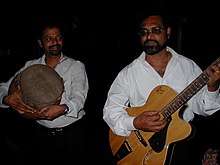
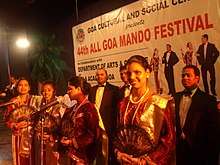
The music has elements of both Indian and western culture. The males wear formal coats, showing Portuguese influence, while females wear a unique Indian costume (bazu torop or pano baju).
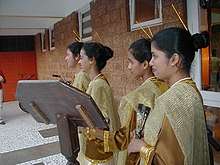
The ceremonial torhop-baz worn during the mando dance was of velvet or silk, red, blue or green in colour, embroidered with gold (rarely with silver) threads. A white or blue shawl was worn. The socks had to be white and the slippers ornamented.
.jpg)
This was all graced with a fan, which enhanced the lady's mood with a secret charm during the dance. Nowadays mandos are highlighted with their dance respective of their song. The plural of manddo in Konkani is mande. The major theme of mandos is love, the minor ones being historical narratives, grievance against exploitation and social injustice, and political resistance during the Portuguese presence in Goa.With grace in voice charm in costumes the performances are enhanced.
Instruments used in mando music are guitars, violins and the ghumot drum.
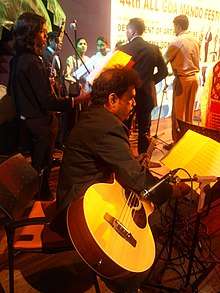
The accent in Konkani is almost always on the last syllable. The dialect used in the classical mandos is the Bambonn Saxtti of Salcete, particularly as spoken in the villages of Benaulim, Curtorim, Cortalim, Dabolim, Dramapur, Loutolim, Margao-Fatorda, Quelossim, and Raia, where most of them originated.[1]
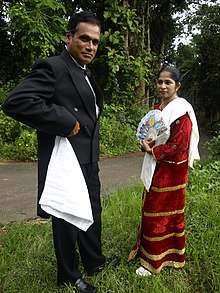
It is the most musical of the Konkani dialects with its consistent use of elisions. One of the characteristics of this dialect is that words are stretched out in pronunciation with the addition of an extra vowel sound either in the middle of the words or at the end epenthesis. Thus the word dista is lengthened to disota and sanddlear into sanddilear. The suffixes –i and –o are commonly used to add an extra syllable to a line. Thus larar becomes larari and neketr becomes neketro. The full sound -o- is softened in this dialect. Thus roddonk becomes roddunk, mozo becomes muzo. The possessive pronouns in the mando have the Salcete form, as tugel´lem for tujem, mugel´lem for mujem or mojem. Shorter forms are derived when the music needs to cut off a syllable, e.g. tuj´ kodden (koddem) instead of tuje koddem and mak´ naka instead of maka naka. Not only the phonetics correspond to the Salcete dialect but also words like masoli (masli) for “fish” instead of nishtem, e.g. “Dongrari fulo nam, doriant masli pun nam”. The Brahmins address a girl or a woman with “rê” instead of “gô” and use the pronoun “ti” instead of “tem”.
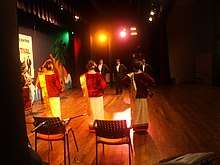
The mando is mostly a monologue, in the first person singular or plural, except for the historical narratives. In some mandos, however, one person addresses another, who in turn replies. Singing is accompanied by gentle turning sideways to the rhythm, thus creating both a visual and auditory performance.
| Adeus Korchu Vellu Paulu (The Farewell Hour is here) | |
|---|---|
| Konkani lyrics | Translation |
| First stanza | |
|
Adeus korchu vellu paulo. |
The time of farewell is now here. |
| Repeat | |
|
Dispediru korchea vellar, |
At this moment of saying farewell, |
| Repeat | |
| Refrain | |
| Second stanza | |
|
Vochu voch rê roddum-naka, |
Godspeed, Godspeed, do not weep, |
| Repeat verse | |
| Third Stanza | |
|
Sogleam amkamgo sanddunum, |
Leaving all your friends this way, |
| Repeat | |
|
Tuj' felicidad' choicheako, |
To witness your joyful cheer, |
| Repeat | |
| Repeat Refrain | |
| Fourth Stanza | |
|
Forsan adeus kortam tuka. |
Reluctantantly farewell to you I'm bidding, |
| Repeat | |
|
Zaitem martir hanv bhogitam, |
I'am suffering much tortured feeling, |
| Repeat | |
| Repeat Refrain | |
| Source: Mando taken from the Greatest Konkani Song Hits Vol. 1 (2009)[2] | |
| Tambdde Roza (Tuje Pole) (Rosy Pink Art Thy Cheeks) | |
|---|---|
| Konkani lyrics | Translation |
| First stanza | |
|
Tambdde roza tuje pole. |
Your cheeks are like roses red. |
| Second stanza | |
|
Papachem licens asa rê mhaka. |
I have my father's approval, I do. |
| Third stanza | |
|
Soglle chole ekttaim zanv, |
All the boys used to gather round, |
| Third stanza | |
|
Papan kazar keli mhaka. |
My father did get me wed. |
| Source: Mando by Ligório Costa (1851–1919) taken from the Greatest Konkani Song Hits Vol. 1 (2009)[3] | |
Some other mandos are:
- Bara Tera Orsam Zalim
- Dove Rozericho Collo
- Gupit Môg Burgeaponancho
- Sangato Moga Tuzo
References
- Rodrigues 2009, p. 22
- Rodrigues 2009, pp. 24–25
- Rodrigues 2009, pp. 212
- Sources
- Rodrigues, Francis (2009), Greatest Konkani Song Hits Vol. 1, Toronto: Pater Publications, ISBN 978-0-9811794-0-7, retrieved 2010-02-22